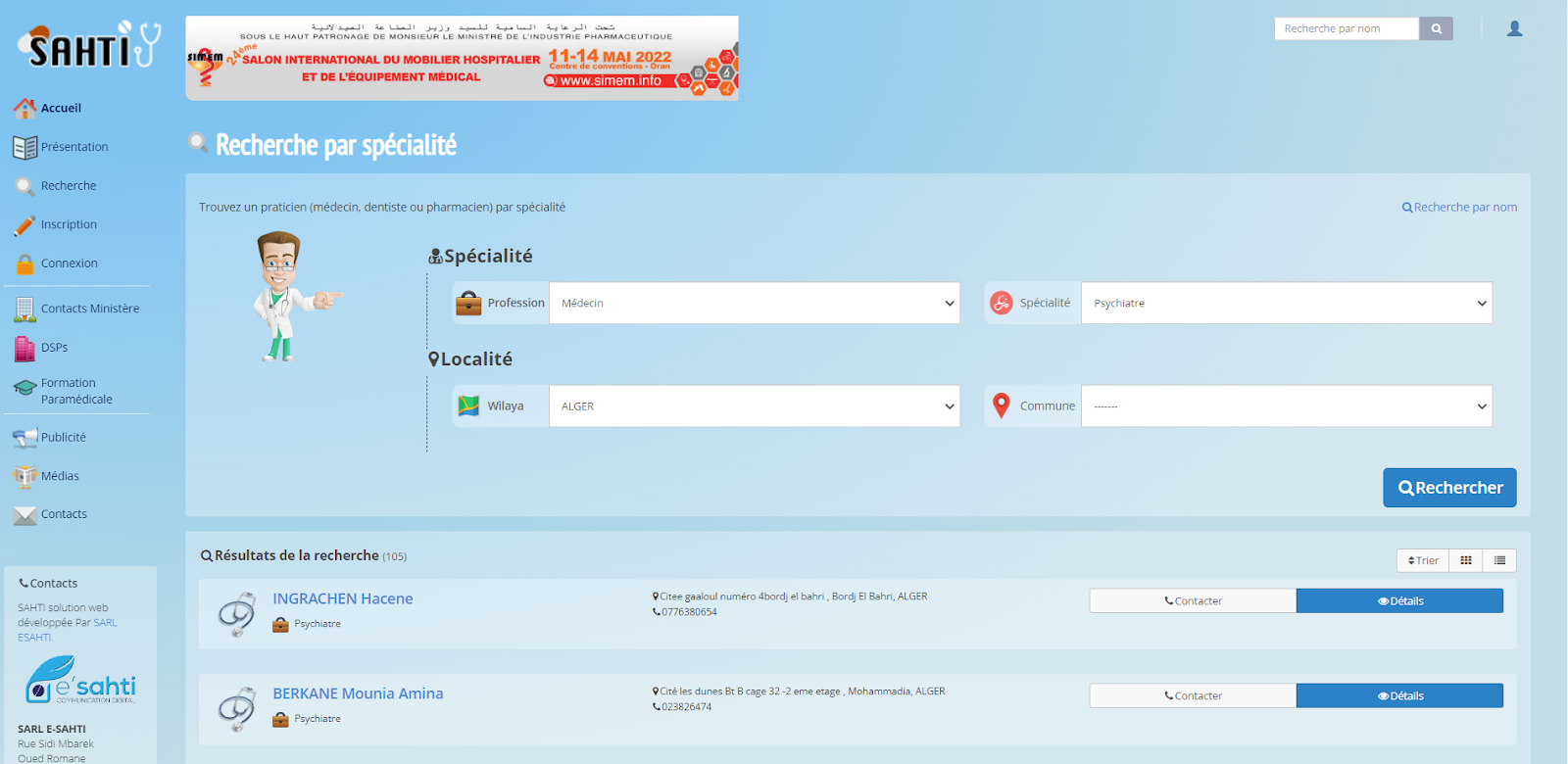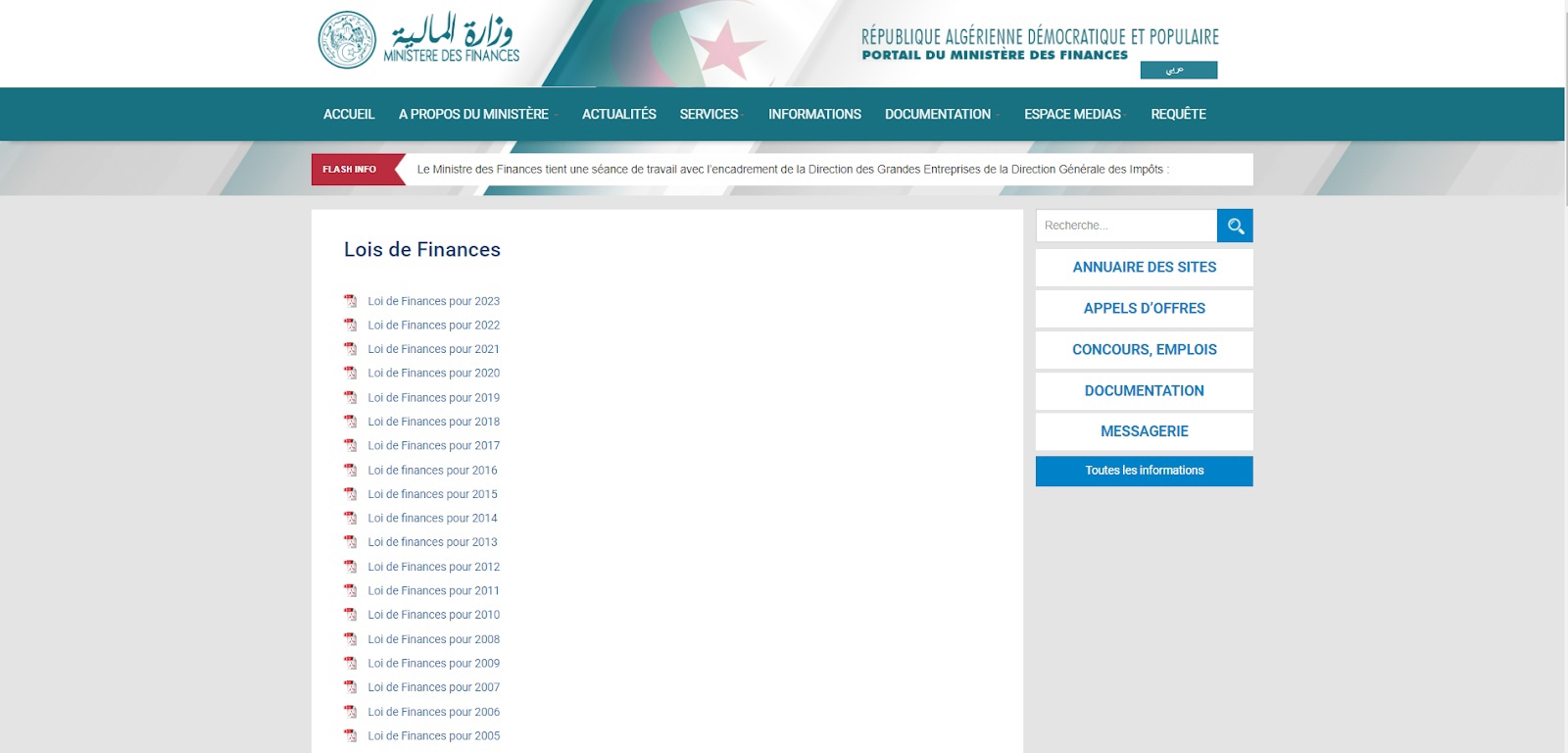E-Government Development in Algeria
The Algerian government has been consistently developing digital public platforms and has set ambitious targets in this sphere. Some of the e-services are being developed in close cooperation with foreign companies and international organisations.
Despite the relatively high level of development of electronic public services in Algeria, the platforms’ design is not unified. Many platforms require adjustments in the implementation of the stated functionality. Thus, the Portal of public procurement does not have a search function, which makes it difficult to interact with the service, the information about decisions and changes on tenders has not been published yet.
Among the most promising areas of cooperation with Algeria are education (assistance in the development of e-services) and healthcare (expansion of the use and functionality of existing services).
Rankings
As of 2022, Algeria ranked 112th in the UN E-Government Survey, being the 9th among African countries, with about 60% of the population having Internet access.
As per the World Bank’s GovTech Maturity Index report, in 2022, Algeria entered group B joining nations with the high level of e-Government development and significant focus on GovTech. Algeria’s GTMI reached 0.5 (compared to the global average of 0.55).
Integration of Public Services
In 2022, the Algerian Prime Minister declared at a National People's Assembly the development of a public services portal which is to integrate 208 public services. As of April 2023, the information about its current stage of implementation is also not available.
National Payment System
The Algerian Interbank Card CIB is used by the major banks of Algeria (BNA, Société Générale Algérie). A card of the Algerian Postal Service – Edahabia is also widespread. In total, about 11.6 million cards have been issued so far, whilst the Algerian population is about 45 million (69% of them are over 14 years old).
Healthcare
The electronic medical card Sihatic has been implemented in the health sector since 2017. The project was led by a private company and gained support from the Ministry of Health of Algeria. According to a research published on the platform of the Algerian Scientific Journal in June 2022 (by M.A. Brahami, Algerian LAPAME Laboratory, and H.M. Dergal), 284 clinics and 16 medical institutions in Algeria have now been digitised.
To make an appointment with a doctor there is a platform SAHTI, developed with the support of the Ministry of Pharmaceutical Industry. However, there is no online-appointment service yet, the platform is an information resource only (phone numbers, emails, and addresses of specialists or clinics are provided).

Source: SAHTI
Education
Functionalities of the Public education services are currently limited to registering for examinations; digital records of grades, assignments, etc., a school digital pass system are not available in schools. In 2021, a pilot program of the digital school was launched. At the end of October 2022, at the Education and Knowledge Technologies Exhibition Educteck participants, including foreign ones, shared their experience of informatisation in the field of education.
Citizens Participation and e-Elections
There are no integrated platforms for electronic surveys, feedback and complaints. However, users have an option to leave complaints and take surveys on some government websites, there is also an electronic service for complaints to the prosecutor’s office.
The electronic voting and counting system for polling stations is at the pilot stage of implementation. It was tested at the by-elections for the National Council in 2022. Voters can register using an electronic card and place an electronic signature. The online voting system is yet to be implemented.
Transport and Customs
In the area of traffic regulation, the LAPI (automatic licence plate reader) system is functioning. This system registers the number plates of passing vehicles and systematically reviews a specialised basic file of stolen vehicles. The database in the system makes it possible to identify vehicles wanted by Interpol in Algeria and abroad; the system can read 8,000 characters per day. However, there are no cameras with the ability to monitor traffic and detect accidents automatically. It is planned to place such cameras on the AEO (East-West) highway.
The Albocos platform is used for border control. Its biometric identification speeds up the process of border control and reduces the time of passport control "to less than 5 minutes". Passport reading is also integrated into the platform, but manual work of operators is still required at all stages. Afis-Criminal solution is integrated into the same system, which allows identification of wanted persons by fingerprints and comparison of information from the database of wanted persons registered in the police identification and search system (Sirpal) with MRZ code in passport.
With the assistance of South Korea a single window ( guichet unique ) project was implemented in 2022 by Algerian Customs Service. It reduces the time and cost of compliance with control requirements and improves communication between the various participants in foreign trade activities. With the support of Huawei, in 2018, a data centre for customs was opened.
Legislation
There are no portals with draft legislative or regulatory acts; online arbitration, registration and storage of documents of legislative process is also not available. Some laws and regulatory acts can be accessed through the responsible ministry’s website (e.g. Financial Laws on the Ministry of Finance’s site). The only service in the field of justice which is implemented so far is an electronic request of the certificate of absence/presence of criminal record through the website of the Ministry of Justice.

Source: Algerian Ministry of Finance
Identification and Biometrics
A project of a national identification number is under implementation (Numéro d'Identification National - NIN). A facial recognition service has been functioning for pensioners since 2021 (in order to reduce paper-based procedures).
17 million Biometric Cards (CNIBE) have been issued by 2019.
Data Management and Infrastructure
There is also no unified public data storage and management platform, although plans on its implementation are being worked out. In 2020, the Ministry of Post and Telecommunications developed a road map to increase investment in the cloud storage sector. Several private solutions are presented in the Algerian market: for example, eBS WebServices (Algeria), AP Cloud (South Africa), Icosnet (Algeria), ATM Mobilis (Algeria). In 2018, a data centre for customs was opened in collaboration with Huawei.
Authors:
Meziane Yazag
Olesya Kalashnik
Have you spotted a typo?
Highlight it, click Ctrl+Enter and send us a message. Thank you for your help!
To be used only for spelling or punctuation mistakes.